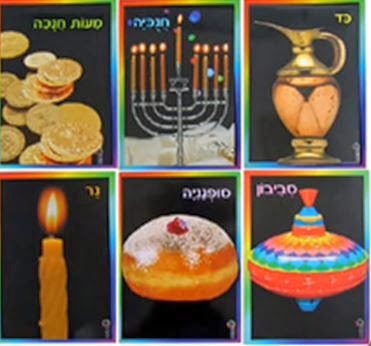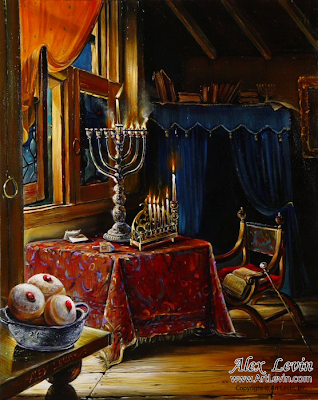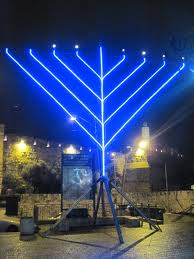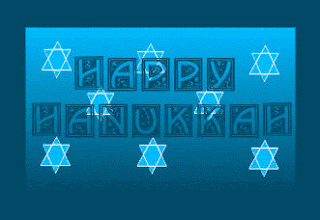Showing posts with label Chanukkah. Show all posts
Showing posts with label Chanukkah. Show all posts
Wednesday, December 4, 2013
Monday, December 2, 2013
Friday, November 29, 2013
Tuesday, November 26, 2013
What is Hanukkah (Chanukah)? (Nov. 27-Dec. 5, 2013)
What is Hanukkah?
Chanukah occurs in the Hebrew calendar month of Kislev. This year, 2013 the date is November 27-December 5.
Chanukah -- the eight-day festival of light that begins on the eve of the 25th of the Jewish month of Kislev-- celebrates the triumph of lightover darkness, of purity overadulteration, of spirituality over materiality.
More than twenty-one centuries ago, the Holy Land was ruled by the Seleucids (Syrian-Greeks), who sought to forcefully Hellenize the people of Israel. Against all odds, a small band of faithful Jews defeated one of the mightiest armies on earth, drove the Greeks from the land, reclaimed the Holy Temple in Jerusalem and rededicated it to the service of G-d.
When they sought to light the Temple's menorah (the seven branched candelabrum), they found only a single cruse of olive oil that had escaped contamination by the Greeks; miraculously, the one-day supply burned for eight days, until new oil could be prepared under conditions of ritual purity.
To commemorate and publicize these miracles, the sages instituted the festival of Chanukah. At the heart of the festival is the nightly menorah (candelabrum) lighting: a single flame on the first night, two on the second evening, and so on till the eighth night of Chanukah, when all eight lights are kindled.
On Chanukah we also add the Hallel and Al HaNissim in our daily prayers to offer praise and thanksgiving to G-d for "delivering the strong into the hands of the weak, the many into the hands of the few... the wicked into the hands of therighteous."
Chanukah customs include eating foods fried in oil -- latkes (potato pancakes) and sufganiot (doughnuts); playing with the dreidel (a spinning top on which are inscribed the Hebrew letters nun, gimmel, hei and shin, an acronym for Nes Gadol Hayah Sham, "a great miracle happened there"); and the giving ofChanukah gelt, gifts of money, to children.
Click here for the complete story of Chanukah, and here for a comprehensive "How To" guide for the observances and customs of Chanukah.
From: Chabad.org
Labels:
Chanukah,
Chanukkah,
Dedication of LIghts,
feast,
Festival of Lights,
Greeks,
Hanukiyah,
Hanukkah,
Holy Land,
Holy Temple,
Jewish,
Kislev,
latkes,
menorah,
miracles,
olive oil,
sufganiot,
triumph
Sunday, November 24, 2013
Happy Hanukkah to our Jewish Friends! (The Feast of Dedication, Festival of Lights starts Nov. 26 Wed. PM for 8 Days)
Blessings on ye heads!
Steve & Laurie Martin
Love For His People
| Image Courtesy: wikiPedia |
Hanukkah is known as the Festival of Lights and the Feast of Dedication celebrated by the Jewish community all over the world. This festival takes place in December every year right around the same time that Christmas is celebrated for non-Jewish Christians. The festival lasts for eight nights where a candle is lit every night on a menorah hence being given the name the festival of lights. The literal meaning of Hanukkah is to dedicate. The Jews regained control of Jerusalem and rededicated the Temple on that day.
There is series of rituals performed by the Jews during these eight days of the Hanukkah festival. Some of them are family based and some are collective. There are significant addends to the daily prayer and an additional prayer is added on to the blessing after a meal. It is different from other rituals because there is no special celebration where Jewish people are able to get off of work. Jewish people go to their work as usual but typically leave work early to light the candles before nightfall. Because of the fact that this is not considered as one of the primarily religious holidays schools typically don’t close. In Israel school remains closed from day two of the festival through to the last day of Hanukkah.
Over the course of this eight day festival many families give each family member and even friends one gift per night. Additionally, people eat an abundance of friend food during this time to celebrate the important role oil plays during Hanukkah celebration. There are three kinds of blessings which are recited throughout this eight day festival. There is a particular procedure of their recitation. On the first day all of three blessings are recited. On the next night they recite only two and so on.
There are other ways that Hanukkah is celebrated depending on what part of the world you live in. For some families, they may sing Hanukkah songs instead of lighting candles on the menorah. Other activities that families often do together for Hanukkah, are making baked goods such as pastries, cookies and other traditional Jewish food and playing games with a dreidle, which is a wooden octagon shaped “top” that has certain Jewish related symbols. Depending on the symbol that shows up when you spin it and it stops you have a specific action to do. This is a favourite amongst children in the Jewish faith.
Thursday, November 21, 2013
Thursday, December 6, 2012
Wednesday, December 5, 2012
Hanukkah
Hanukkah
| Hanukkah | |
|---|---|
 A Hanukkiya or | |
| Official name | Hebrew: חֲנֻכָּה or חנוכה English translation: "Establishing" or "Dedication" (of the Temple in Jerusalem) |
| Also called | Festival of Lights, Festival of Dedication |
| Observed by | Jews |
| Type | Jewish |
| Significance | The Maccabees successfully rebelled against Antiochus IV Epiphanes. According to the Talmud, a late text, the Temple was purified and the wicks of the menorah miraculously burned for eight days, even though there was only enough sacred oil for one day's lighting. |
| Begins | 25 Kislev |
| Ends | 2 Tevet or 3 Tevet |
| 2012 date | Sunset, December 8 to nightfall, December 16 |
| Celebrations | Lighting candles each night. Singing special songs, such as Ma'oz Tzur. Reciting Hallel |
| Related to | Purim, as a rabbinically decreed holiday. |
Hanukkah (Hebrew: חֲנֻכָּה, Tiberian: Ḥănukkāh, usually spelled חנוכה, pronounced [χanuˈka] in Modern Hebrew; a transliteration also romanized as Chanukah, Chanukkah or Chanuka), also known as the Festival of Lights, is an eight-day Jewish holiday commemorating the rededication of the Holy Temple (the Second Temple) in Jerusalem at the time of the Maccabean Revolt of the 2nd century BCE.
Hanukkah is observed for eight nights and days, starting on the 25th day of Kislev according to the Hebrew calendar, which may occur at any time from late November to late December in the Gregorian calendar.
The festival is observed by the kindling of the lights of a unique candelabrum, the nine-branched Menorah or Hanukiah, one additional light on each night of the holiday, progressing to eight on the final night. The typical Menorah consists of eight branches with an additional raised branch. The extra light is called a shamash (Hebrew: שמש, "attendant")[1] and is given a distinct location, usually above or below the rest. The purpose of the shamash is to have a light available for use, as using the Hanukkah lights themselves is forbidden.[2]
The name "Hanukkah" derives from the Hebrew verb "חנך", meaning "to dedicate". On Hanukkah, the Jews regained control of Jerusalem and rededicated the Temple.[3]
Many homiletical explanations have been given for the name:[4]
Maccabees, Mishna and Talmud
The story of Hanukkah, along with its laws and customs, is entirely missing from the Mishna apart from several passing references (Bikkurim 1:6, Rosh HaShanah 1:3, Taanit 2:10, Megillah 3:4 and 3:6, Moed Katan 3:9, and Bava Kama 6:6). Rav Nissim Gaon postulates in his Hakdamah Le'mafteach Hatalmud that information on the holiday was so commonplace that the Mishna felt no need to explain it. Reuvein Margolies[6] suggests that as the Mishnah was redacted after the Bar Kochba revolt, its editors were reluctant to include explicit discussion of a holiday celebrating another relatively recent revolt against a foreign ruler, for fear of antagonizing the Romans.The story of Hanukkah is preserved in the books of the First and Second Maccabees. These books are not part of the Tanakh (Hebrew Bible); they are apocryphal books instead. The miracle of the one-day supply of oil miraculously lasting eight days is first described in the Talmud, written about 600 years after the events described in the books of Maccabees. [7]
The Gemara, in tractate Shabbat 21, focuses on Shabbat candles and moves to Hanukkah candles and says that after the forces of Antiochus IV had been driven from the Temple, the Maccabees discovered that almost all of the ritual olive oil had been profaned. They found only a single container that was still sealed by the High Priest, with enough oil to keep the menorah in the Temple lit for a single day. They used this, yet it burned for eight days (the time it took to have new oil pressed and made ready).[8]
The Talmud presents three options:
- The law requires only one light each night per household,
- A better practice is to light one light each night for each member of the household
- The most preferred practice is to vary the number of lights each night.
[edit] Narrative of Josephus
The ancient Jewish Historian Flavius Josephus narrates in his book Jewish Antiquities XII, how the victorious Judas Maccabeus ordered lavish yearly eight-day festivities after rededicating the Temple in Jerusalem that had been profaned by Antiochus IV Epiphanes. Josephus does not say the festival was called Hannukkah but rather the "Festival of Lights":
"Now Judas celebrated the festival of the restoration of the sacrifices of the temple for eight days, and omitted no sort of pleasures thereon; but he feasted them upon very rich and splendid sacrifices; and he honored God, and delighted them by hymns and psalms. Nay, they were so very glad at the revival of their customs, when, after a long time of intermission, they unexpectedly had regained the freedom of their worship, that they made it a law for their posterity, that they should keep a festival, on account of the restoration of their temple worship, for eight days. And from that time to this we celebrate this festival, and call it Lights. I suppose the reason was, because this liberty beyond our hopes appeared to us; and that thence was the name given to that festival. Judas also rebuilt the walls round about the city, and reared towers of great height against the incursions of enemies, and set guards therein. He also fortified the city Bethsura, that it might serve as a citadel against any distresses that might come from our enemies."[9]
Other ancient sources
The story of Hanukkah is alluded to in the book of 1 Maccabees and 2 Maccabees. The eight-day rededication of the temple is described in 1 Maccabees 4:36 et seq, though the name of the festival and the miracle of the lights do not appear here. A story similar in character, and obviously older in date, is the one alluded to in 2 Maccabees 1:18 et seq according to which the relighting of the altar fire by Nehemiah was due to a miracle which occurred on the 25th of Kislev, and which appears to be given as the reason for the selection of the same date for the rededication of the altar by Judah Maccabee.Another source is the Megillat Antiochus. This work (also known as "Megillat HaHasmonaim", "Megillat Hanukkah" or "Megillat Yevanit") is in both Aramaic and Hebrew; the Hebrew version is a literal translation from the Aramaic original. Recent scholarship dates it to somewhere between the 2nd and 5th Centuries, probably in the 2nd century,[10] with the Hebrew dating to the 7th century.[11] It was published for the first time in Mantua in 1557. Saadia Gaon, who translated it into Arabic in the 9th century, ascribed it to the Maccabees themselves, disputed by some, since it gives dates as so many years before the destruction of the second temple in 70 CE.[12] The Hebrew text with an English translation can be found in the Siddur of Philip Birnbaum.
The Christian Bible refers to Jesus being at the Jerusalem Temple during "the Feast of Dedication and it was winter" in John 10:22-23, the Greek term used is "the renewals" (Greek ta engkainia τὰ ἐγκαίνια).[13] Josephus refers to the festival as "lights."[14]
http://en.wikipedia.org/wiki/Hanukkah
Subscribe to:
Posts (Atom)

.jpg)
.jpg)
.jpg)
.jpg)
.jpg)

































